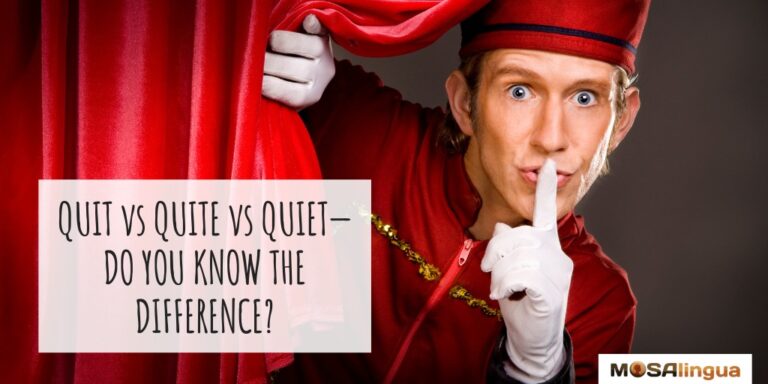Are you quite sure that you know when to use quit, quite or quiet? It might seem quite confusing. But before you quit (I’m sorry, I couldn’t resist), let me explain the differences between these three words and hopefully make them seem simple!

Quit, Quite or Quiet? How Are They Used?
These three words may look alike, but they are different in terms of both pronunciation and meaning.
Pronunciation
First, let’s look at the pronunciation of these three words.
Quit
This word is only one syllable and it uses the short I vowel sound. It rhymes with bit, it, and kit.
Quite
This word is also only one syllable. However, due to it having an “e” on the end, the vowel sound becomes long. It rhymes with height, might, and bite.
Quiet
Finally, this word has two syllables. The first vowel sound is long, then we add a “y” sound to break up the vowels, then pronounce the “e” similar to how we’d pronounce a short “i” sound. It rhymes with riot and buy it.
So, as you can see, all three words are pronounced slightly differently. And it’s important to pronounce them correctly, otherwise, you may cause some confusion…
Improve your spoken English

Good news: we have a course for that: the Speak English with Confidence MasterClass.
It’s a comprehensive 10-module course designed to help you improve every aspect of your spoken English – fluency, confidence, pronunciation, and more – step by step, and enjoy doing it.
Meaning
Now, let’s look at the meaning of these three words.
Quit (kwɪt)
Quit is a verb.
This means to stop doing something, for example, to stop an activity.
It can also be used to ask other people to stop doing something, like an order.
We also use quit when talking about computers and technology. For example, to quit a website, or to quit an application.
Let’s look at some examples…
- “I quit basketball because I was too busy.”
- “I quit my job because I hated my boss.”
- “Quit making that noise. It’s so annoying!”
- “You can quit the webpage by clicking the red cross.”
Quite (kwaɪt)
Quite is a quantifier. It means a little or somewhat.
- “She is quite tall.”
- “I feel quite sad about my friend leaving town.”
- “I am quite shy.”
What’s a quantifier?
A quantifier is a word that tells us about the quantity of something. We can use it to tell us how much or how little something is.
Examples of quantifiers are a little, a lot, much, many, some, and few.
Quiet (kwaɪ.ət)
Quiet is an adjective.
This is the opposite of loud. It means not making much noise.
- “The room was quiet. I could barely hear a sound.”
- “Be quiet! I am trying to concentrate.”
- “Shh. Please be quiet while the students are studying.”
Video: Quit vs Quite vs Quiet, Explained
As you can see, these three words are all different in meaning and pronunciation. However, due to their similar spelling and similar enough pronunciation, they are often confused. I hope it is now clear and you are quite ready to use quit, quite, and quiet without fear of getting them mixed up!
Remember, depending on how you pronounce it, the word has a completely different meaning! (Although if you do make a mistake, the person you’re talking to will probably be able to figure out what you meant based on the rest of your sentence. Therefore, don’t let the fear of making a mistake keep you from speaking!)
For more practice with these words, you can like this video about them. We even recommend saving it to an English language learning playlist on YouTube so that you can refer back to it if needed!
Also, be sure to subscribe to our YouTube channel for more videos and tips about English and other languages.
Quit, Quite or Quiet: Quiz
Now, test your knowledge! For each example, fill in the blank with either quit, quite or quiet.
Next Steps…
If you liked this video, here are some others you may enjoy:




Comments